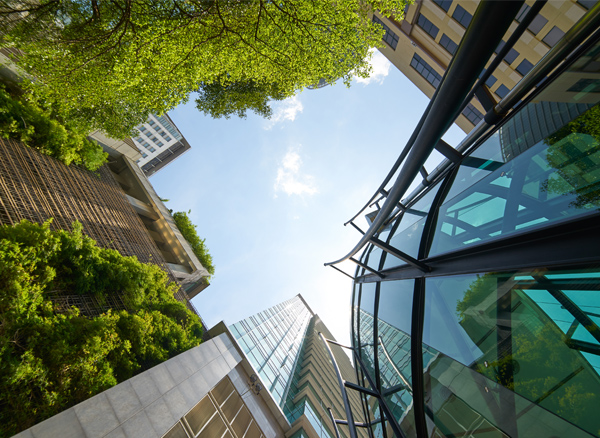

Creating sustainable business events
Business meetings, conferences and events are a large part of business, providing employees, customers, partners and the supply chain opportunities to build meaningful relationships, share knowledge, innovate and grow. According to a 2022 CTM global customer survey conducted in May, 59 % of respondents are seeking to conduct more in-person meetings over the next 12 months.
CTM Meetings & Events (CTM M&E) is positioned to assist customers in delivering more sustainable event and travel choices that support people, communities and the environment. Sustainability solutions such as the CTM Climate+ programme assist customers to better understand the impact of their travel and also provide solutions to reach climate neutrality goals by offsetting the carbon emissions created by their business travel activity.

Sustainability has increasingly become a global focus. More than 400 companies signed a pledge at 2021’s Davos World Economic Forum to decarbonise by 2050. This number comprises some of the biggest companies in the world, and smaller companies are making similar commitments. Organisations are reviewing their policies and processes to encourage more sustainable choices and practices.
While the thought of arranging an event that meets organisational sustainability strategies and policy might be overwhelming, small and manageable actions can go a long way to protecting the environment, supporting local communities, and also may save organisations some money along the way.
Good planning and event design
Using an event management company will ensure expert advice, strategic planning and event design to meet the requirements of the organisation. However, in the discovery phase of the planning, organisations must be clear on their sustainability goals and what they wish to achieve.
A more sustainable business event design may require consideration of where and how an organisation wishes to host their events. Should a central venue location be selected? A consideration might be to host outdoor breakout sessions to reduce electricity use for example.
Selecting suppliers that fit with an organisation’s sustainability policy will be of importance. Where organisations have had established relationships with suppliers, but no longer align, a consideration of sourcing new suppliers may be made.
Going digital (pending the demographic of your audience) may be part of an organisation’s preferred delivery method. Utilising online registration and communication platforms is more sustainable, cost-effective, and will save delegates time and eliminate paper printouts.
Creating sustainable business events involves planning and preparation. An event management company like CTM M&E can assist in carefully examining all areas of an event to determine how it can become more sustainable and environmentally friendly, including location, transportation and food.
Selecting event partners
An event’s carbon footprint can be reduced by looking at some of the big decisions in the event planning process, like where the event is held. According to a recent Global Business Travel Association sustainability report, 74% of respondents rank both investing in more energy-efficient technologies and phasing out single-use plastic products as the most impactful way for their suppliers to improve their environmental performance.
Further to this, the 2022 CTM global customer survey revealed 72% of respondents say having access to supply chain sustainability strategy information in the coming 12 months is important – very important and 57% seek environmental sustainability features when selecting airline, hotel, and car rental providers. As such, organisations may wish to make event sustainability a requirement when selecting a venue, sponsors or associated event partners as part of the event’s overall sustainability goals.
The ultimate goal for organisations may be to have all stakeholders aligned in their sustainability efforts. This will help create a more seamless experience where organisations are not the only ones contributing toward a sustainable event.

When procuring event partners, questions to consider might be:
- Does the hotel or venue have programmes in place that reduce water usage or use renewable energy?
- Does the venue have accreditation for sustainable events like ISO 20121?
- Does the venue have a recycling programme? Are they paperless? Is there natural light and ventilation?
- Does the accommodation have opt-out housekeeping services, and do they support local or sustainable businesses?
- Does the city you choose impact your carbon footprint because of the carbon intensity of the local power grid or the availability of public transit in the area?
- Does the catering use the least amount of packaging possible?
- Is there an opportunity to support the local community by using local high-quality food?
Find ways to reduce food waste
Having sufficient catering is always of importance, ensuring delegates are energised to learn, network and be engaged through the duration of the event. However, there are considerations to make that will assist in reducing food wastage.

Partnering with a venue that has already established sustainable practices will make catering easier. This way, they may already have recycling or composting programmes in place. In cases where the venue does not have such programmes established, there may be an opportunity to donate to a local food donation programme (in accordance with food and health regulations). Check with the venue as they may already work with local charities including food banks or social enterprises.
Another consideration around food is to order local food. While it will not reduce waste, it is a better option not only in terms of environmental responsibility but also in supporting the local economy and offering a local experience for your delegates, especially for international visitors.
Reuse and recycle
Recycling is not new and is a big part of sustainable living and something that can be easily implemented into an organisation’s sustainable event strategy. For things like lanyards and signs, organisations may wish to avoid personalising them where possible so they can be reused for future events. That way, this reduces waste but also saves money and time.
Banning single-use plastic can be applied to menu choices with minimal packaging, ideally supplied in biodegradable or recyclable containers. With many more sustainable products available, whether it be biodegradable or bamboo for example, there are sufficient options to reduce your event’s carbon footprint.
Recycling education for delegates can also be carried out by inserting notices in event programmes or listed digitally. Placing clear signs on bins and communicating where and why to recycle will make it easier for delegates to know what to do and where to go. Having dedicated stations to collect recyclable materials will mean after the event recycling will be easy and prevent wastage.
Other areas of consideration might be:
- Encourage delegates to refill water bottles through drinking water stations
- Use compostable items and reusable crockery for take-away options
- Ensure any packaging the food arrives in is recyclable
- Ensuring an ethical supply chain and materials with the smallest carbon footprint.
Conference tote bags have historically been filled with plastic promotional items and use energy and resources to produce, only to be discarded in rubbish and end up in landfill. Organisations need to think about what they want to achieve by providing tote bags. For those that do decide to provide them to delegates, consider providing reusable branded tote bags, recycled notebooks, plant and seed packets, reusable cups and mugs. This also provides opportunities for extended brand awareness through repeated use.
Organisations may also like to refrain from date stamping any of the items for longevity and future use. To ensure the promotional suppliers are using ethically sourced materials that are environmentally friendly, a recommendation is to ask what social and environmental certifications the suppliers have.
Reduce carbon footprint
The global pandemic has cast a spotlight on sustainability where 83% of global travellers believe sustainable travel is vital and 61% say the pandemic has made them want to travel more sustainably in the future. There are more sustainable options for organisations to consider when it comes to transport, whether it be land or air, and this may result in reducing the carbon footprint.
- Should delegates require transportation whilst in the event destination, there are options for eco-friendly car hire, such as hybrid or electric vehicles, and public transport.
- Ride-share services are another great way to lower carbon footprint and lower cost wastage by allowing delegates and colleagues to travel together and reducing the cost of travel.
- Select a venue and accommodation that are within walking distance, or a venue with onsite accommodation to eliminate ground transport.
- An event management expert like CTM M&E can coordinate flight arrival and departure times enabling group transfers and thereby limiting the amount of ground transportation required.

In the CTM 2022 global customer survey, 71% of respondents said their carbon footprint will be an important to very important consideration for their travel programme over the next 12 months. Through CTM Climate+, customers can offset against flights, accommodation and car hire. Organisations can calculate, record and report CO2 emissions per trip and per traveller by:
- Total CO2 emissions by month
- Average CO2 emissions per trip and per traveller
- CO2 emissions by service type (air/ hotel/ car/ rail) and by the service provider
- CO2 emissions by fare class.
Through our partnership with South Pole, a leading project developer and global climate action expert, organisations can offset their carbon footprint against a range of global climate action and sustainability projects.

Did you know?
- Sustainable Aviation Fuels (SAF) are being produced and used in commercial flights every day. Since December 2019, more than 215,000 commercial flights using SAF have been performed, 40 airlines have SAF experience, and there are 6 billion litres of SAF in forward purchase agreements (source: IATA).
- Delta Airlines were the first to sign a multi-year SAF agreement with CTM. The three-year deal will reduce lifecycle emissions by 209 metric tons of carbon dioxide, which is equivalent to the amount of carbon sequestered by 256 acres of U.S. forests.
CTM M&E work in conjunction with organisations to consider the logistics and environmentally friendly practices suitable to their event needs and objectives, to ensure they get the most out of their event while meeting their sustainability goals. A shift towards sustainable business events and practices provides an opportunity for all key stakeholders to work together proactively in achieving sustainability goals.



